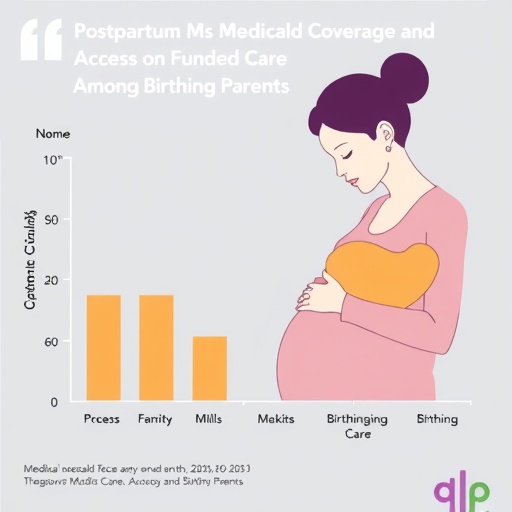A recent study published in JAMA Health Forum delivers compelling evidence on the impact of extending Medicaid coverage to 12 months postpartum, demonstrating significant improvements in access to both medical and behavioral health care services for new mothers. This research delves deeply into how prolonging coverage beyond the traditional 60-day postpartum period facilitates enhanced health outcomes by enabling continuous and comprehensive care during a critically vulnerable phase. The findings offer a crucial resource for policymakers and health officials striving to redesign maternal healthcare policies to better support postpartum women.
Medicaid, the United States’ primary public health insurance program for low-income individuals and families, has historically limited postpartum coverage primarily to the first 60 days after childbirth. This restriction often leaves many new mothers without insurance precisely when they face the highest risk of complications ranging from chronic medical conditions to maternal mental health disorders. By extending coverage to a full year, the study suggests that many barriers to accessing necessary medical interventions and behavioral health services are mitigated, potentially transforming the postpartum care landscape.
The study utilized a comprehensive cohort analysis comparing health care utilization and outcomes among postpartum women before and after the implementation of extended Medicaid coverage. Through stratified data collection methods that captured prenatal, perinatal, and extensive postpartum medical claims, researchers were able to quantify increases in both preventive service usage and ongoing treatment for chronic conditions. This approach allowed a multifaceted assessment of how health coverage duration influences health trajectories beyond the immediate postpartum window.
One of the most striking revelations centers around the increased opportunities for behavioral health interventions, including screenings and treatment for postpartum depression, anxiety, and other psychiatric conditions. Behavioral health care is critical during postpartum phases, yet often remains underutilized due to insurance lapses. With extended Medicaid benefits, new mothers gained sustained access to counseling, therapy, and pharmacological treatments, thus addressing a significant public health gap with potential long-term benefits for both maternal and child well-being.
Chronic disease management, often sidelined during pregnancy, resumes priority once medial insurance stabilizes postpartum. The study highlights improved continuity of care for persistent conditions such as hypertension, diabetes, and cardiovascular disease—all of which significantly elevate maternal morbidity and mortality risks when unmanaged. Prolonged Medicaid coverage empowers healthcare providers to initiate, monitor, and adjust treatments that might otherwise be interrupted by insurance expiration, reducing adverse health events and emergency care reliance.
Prevention also features prominently as a benefit of extended coverage. Postpartum preventive care visits, screenings for infectious diseases, family planning services, and health education become more accessible when coverage extends beyond the initial postpartum period. These preventive measures contribute not only to healthier mothers but also create ripple effects for infant and household health environments. Consistent care coverage reduces the health disparities commonly observed in socioeconomically disadvantaged populations dependent on Medicaid.
From a health economics perspective, the extension of Medicaid postpartum coverage may be cost-effective in the long-term. By preventing costly emergency interventions and hospital readmissions linked to untreated postpartum complications, this policy shift potentially reduces overall healthcare expenditures. Improved management of behavioral and chronic health issues also decreases indirect societal costs related to lost productivity and psychological stress, underscoring the multifaceted benefits of such policy reforms.
This study carries substantial implications for public health policy, particularly as more states consider or have already implemented mandated 12-month postpartum Medicaid coverage under provisions such as the American Rescue Plan Act. By providing empirical data that correlate extended coverage with better healthcare access and outcomes, the research supports the case for universal adoption. Policymakers may find these insights invaluable for refining Medicaid regulations to prioritize the health and equity of postpartum populations.
The documented health benefits associated with extended Medicaid coverage also stress the importance of integrating behavioral and medical care services. The findings call for enhanced coordination between primary care providers, obstetricians, mental health specialists, and community health programs to holistically address postpartum needs. Such interprofessional collaboration could maximize coverage advantages, reduce fragmentation of care, and foster sustainable health improvements.
Moreover, the study underscores that social determinants of health, including socioeconomic status, housing stability, and access to transportation, intersect with insurance coverage to influence postpartum health outcomes. By ensuring continuous Medicaid coverage, healthcare systems can better connect patients with vital social support services that mitigate these broader determinants, thus promoting health equity and resilience among new mothers.
Given the profound maternal health disparities in the United States, particularly among women of color who face disproportionately high rates of maternal mortality and morbidity, the timing and nature of health coverage are pivotal. Extending Medicaid postpartum coverage emerges as a tangible policy lever to bridge these inequities by removing insurance churn as a barrier to consistent care, fostering culturally competent care models, and promoting sustained health engagement.
As this study contributes to the growing evidence base, it may also spur further research into specific mechanisms through which extended coverage impacts various medical and psychosocial outcomes. Future investigations could explore granular aspects such as medication adherence, infant health correlations, or long-term economic analysis, all of which would deepen understanding of the complexities inherent in postpartum healthcare delivery within Medicaid populations.
Ultimately, this study shines a spotlight on an urgent public health challenge: optimizing care for new mothers during the extended postpartum period. By revealing the benefits of a 12-month Medicaid coverage extension, it makes a powerful case for policy adjustments designed to support better health trajectories not only for postpartum women themselves but also for families and broader communities dependent on equitable healthcare access. The research invites both action and innovation in maternal health policy.
Subject of Research: Impact of extended Medicaid coverage on postpartum healthcare access and outcomes
Article Title: (doi:10.1001/jamahealthforum.2025.1630)
News Publication Date: Not specified
Web References: Not provided
Keywords: Birth rates, Parenting, Health insurance, Finance, Health care, Behaviorism, Medical treatments, Preventive medicine, Public health, Adverse effects




